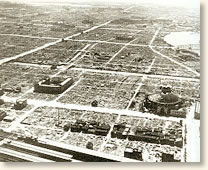In my book, I Wept by the Rivers of Babylon (A Prisoner of Conscience in a Time of War) I address the
doctrine of the Christian church called THE JUST WAR THEORY invented by St. Augustine.
For 2,000 years the true teaching of the Church (True because THEY said so) allowed (under specific circumstances) the
Superior Authorities (of Romans 13: 1,2) to send soldiers off to war.
__________________________________
Excerpt: WHAT IS A JUST WAR? (I Wept by the Rivers of Babylon)
What is the Just War?
Augustine asked Christian readers to consider one man hitting a boy and another man caressing a boy. The first man appears to be brutish and evil and yet he might be a father lovingly disciplining his son! The second man appears to be a good and affectionate person, but in fact may well be a child molester! Augustine reasons, "We find a man by love made to appear fierce; and the other man by evil made to appear winningly gentle." This opens the door for Christians to perform outward acts that might appear to be forbidden by Scripture and yet by those acts do a greater good.
Because God judges the soul, the ultimate consideration is not "what the man does … but with what mind and will he does it." The appropriate motive in all cases, Augustine rules, is love. What is done from love of God must be good. A Christian soldier is under compulsion and love without scruple.
This doctrine was absorbed into the Church and approved as the proper Christian rationale. In his book, The City of God, Augustine elucidates his theory. There Augustine insists there is no "private right" to kill. One can kill only under the authority of God, as communicated by direct or implicit command from God, or by a legitimate ruler who carries out God's intent to restrain evil on earth.
Augustine further suggests one who obeys such a command "does not himself do the killing." He acts only as an instrument of the one who rightfully commands, without debate.
Augustine concludes, "The commandment forbidding killing was not broken by those who have waged wars under authorization of God, or those who have imposed the death-penalty on criminals when representing the authority of the State, the most just and most reasonable source of power."
When there is no command by God, war may be waged only by those with legitimate authority and only for a just cause. The devil was in that particular detail, however! The Church could declare and it would be so.
As long as the Catholic Church remained both religion and State for Christians, the conscience of Christianity remained in repose. Just as God had allowed a transition from Jew to Gentile, He was allowing a transition from pacifism to participation in Civic Authority which included the military.
Conscience Arises
Protestant apostasy created a gaping foundational error which cracked open the consciences of non-Catholic Christian worshippers. All the old worries, scruples and conflicts flew out like bats at dusk from a dark cave. If the Church had no actual God-approved authority to declare Just War—on what basis could the Protestant engage in military action? Now was born a new era of conscience. Protestants fell into an every-man- for-himself, case by case, crisis of conscience. The test was often a life or death decision.
“The wars of Israel were the only 'holy wars' in history. . . there can be no more wars of faith. The only way to overcome our enemy is by loving him.” [1]
“All war must be just the killing of strangers against whom you feel no personal animosity; strangers whom, in other circumstances, you would help if you found them in trouble and who would help you if you needed it.” [2]
Modern Pacifism
Pilgrims arrived at Plymouth Rock in the year of our Lord 1620. Within the short space of thirty-six years they were joined by Mennonites, Amish and Hutterites.
By 1719 the smaller sects were swarming onto the new continent searching for room to practice their unconventional faiths.
Among these were Dunkers, Shakers, Christadelphians and Rogerenes.
Held in common by these otherwise disparate groups was the assertive audacity to self-identify as pacifists in time of war. This included outright refusal to participate in the defense of hearth and home in Indian uprisings or the Revolutionary War.
The problem with this Bible-based scruple was it was suicidal in practice should everybody suddenly decide to turn the other cheek during a battle. It would only be possible if a majority of Christians took up arms against common foe while the pacifists stood idly by praying!
Contrary Argument
"The only real objection which can be argued against the revival of the early Christian attitude is that Christianity has accepted the State and that this carried with it the necessity for coercive discipline within and the waging of war without; in which disagreeable duties Christians must as citizens take their part.”
“To refuse this will expose civilization to disaster. . .The truth is that the way of war, if persisted in, is going to destroy civilization anyhow and the continual demand for war service will, sooner or later, bring modern State anarchy …”
“It is a subject that will not cease to vex the Church until we have decided either to make as unequivocal a condemnation of war as we have of slavery, or to abandon altogether any profession of whole-hearted allegiance to the Christian faith." [1]
[1] Cadoux: Early Christian Attitude to War, Foreword, p. ix-x, Rev. W.E. Orchard
[1] The Cost of Discipleship,Dietrich Bonheoffer
[2] The Private History of the Campaign That Failed, Mark Twain

